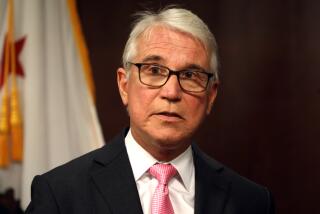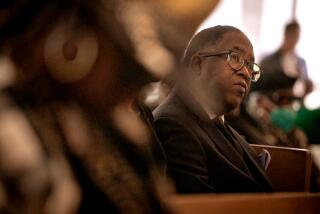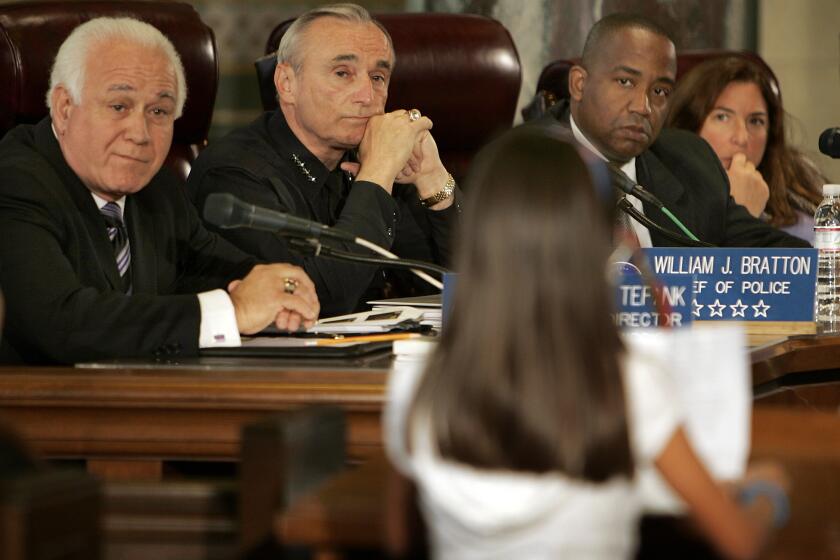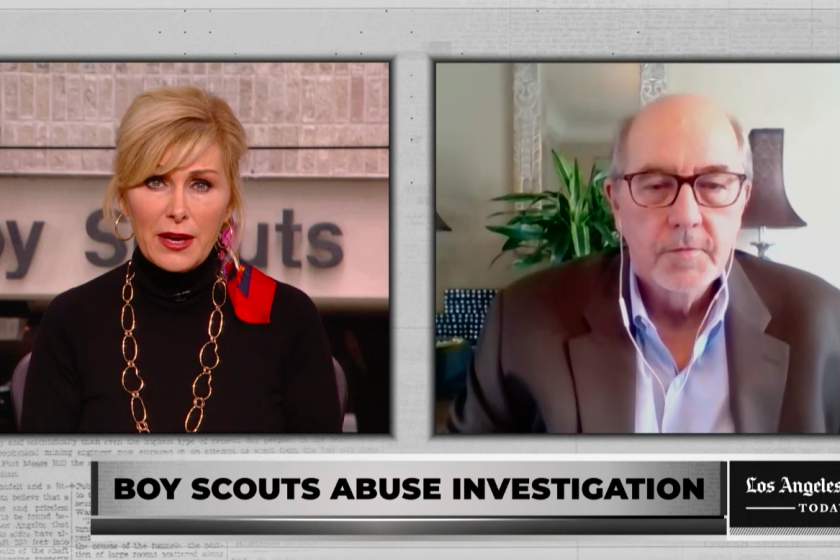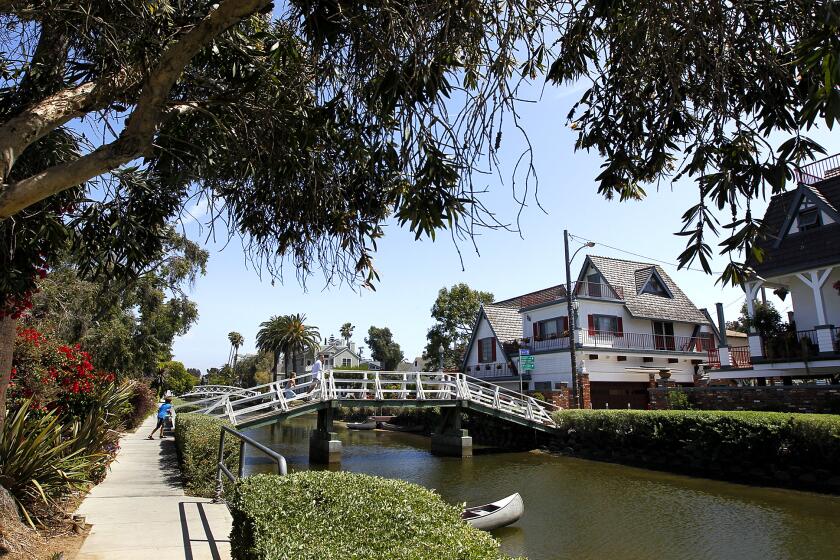LACMA expansion, Ridley-Thomas, ‘super PAC’ intersect in email trail
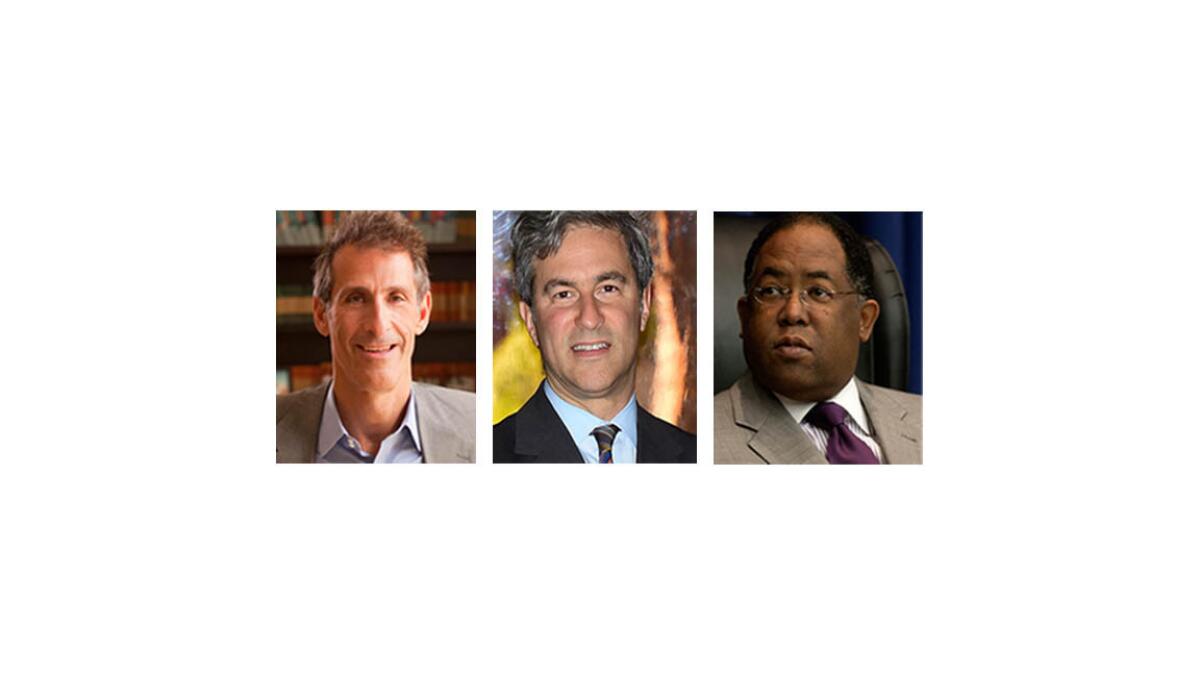
Emails posted on WikiLeaks detail interactions between Michael Lynton, chief executive of
When Michael Lynton, chairman and chief executive of Sony Pictures Entertainment, sat down for lunch last July with L.A. County Supervisor Mark Ridley-Thomas, each wanted something.
Lynton is a trustee of the Los Angeles County Museum of Art, which needed Ridley-Thomas’ support to secure $125 million in county funding for a major expansion.
Ridley-Thomas wanted Sony to donate to a “super PAC” he had founded, which was supporting an aide’s campaign for a seat on the Los Angeles school board.
In September, Sony wrote a check to the PAC for $25,000. Two months later, Ridley-Thomas joined in a unanimous vote by the county supervisors to fund the LACMA expansion.
The lunch meeting, the PAC donation and discussions surrounding them are described in internal Sony emails, which were stolen by hackers and recently posted online by WikiLeaks. The Times reviewed the emails in collaboration with ProPublica, the nonprofit investigative newsroom.
The messages show how LACMA’s leadership courted Ridley-Thomas and how Sony, concerned about appearances, delayed the PAC contribution until a few weeks after the school board election.
A Sony official, Ridley-Thomas’ top aide and LACMA Director Michael Govan all said there was no connection between the contribution and the vote on county funding.
“We would never conduct ourselves in such a manner,” said Keith Weaver, Sony’s executive vice president for worldwide government affairs.
At the time, the museum was lobbying county officials for $125 million to help pay for a $600-million renovation and expansion of its Mid-Wilshire campus.
Govan, in an interview, recalled that in the months before the vote, he was confident he had the support of one county supervisor, Zev Yaroslavsky, but said he was “nervous” about the other four.
Among those, Ridley-Thomas was considered critical, Govan said. Other supervisors could be expected to defer to him because the new building would jut into his district.
Lynton also had a role to play in promoting the museum project. Sony’s studio complex in Culver City is in Ridley-Thomas’ district, and Lynton is “the only person on my board who had regular dealings with the supervisor,” Govan said.
According to the emails, Lynton held a meeting on May 21, 2014, with Weaver and Govan. The subject was Ridley-Thomas; the emails provide no further detail on the meeting.
Weeks later, Sony gave $5,000 to the PAC founded by the supervisor, campaign records show. Sony had made five previous contributions in the same amount since 2007.
In July, Lynton, Ridley-Thomas and two of their aides scheduled a lunch.
When Govan learned of the lunch, he sent two emails to Sony urging Lynton to press the LACMA matter.
The first message, sent to Weaver on July 16, the day before the lunch, and forwarded to Lynton, listed points to be made in support of the museum expansion and said that “this won’t happen if the Supervisor doesn’t support it.”
In the second message, Govan said the timing of the lunch was “perfect and critical.”
In separate emails to Lynton, Weaver noted that the Ridley-Thomas-founded PAC was spending heavily in support of the supervisor’s education advisor, Alex Johnson, in the Los Angeles school board race.
The PAC — the African American Voter Registration, Education and Participation Project — spent nearly $600,000 in support of Johnson’s campaign, according to state records. Johnson was seeking to represent District 1 on the L.A. Unified School District board.
There are no dollar limits on contributions to super PACs as there are for direct donations to candidates.
Vincent Harris, Ridley-Thomas’ chief deputy, said in an interview that the supervisor asked Lynton for a PAC contribution during the July 17 lunch. Harris said the LACMA funding was not discussed, adding that Ridley-Thomas knows better than to “mix fundraising with any public policy-related work.”
Weaver said he wasn’t sure if the group discussed the museum expansion.
After the lunch, Lynton had reservations about making another contribution to the PAC. According to emails between Lynton and Weaver, the Sony chief executive worried that a donation might create the appearance of a conflict because his wife, Jamie Alter Lynton, is executive editor of LA School Report, a news website that covers L.A. Unified.
Weaver wrote that he had talked with Ridley-Thomas’ office and asked for “options” for addressing Lynton’s concern. A few hours later, Weaver wrote Lynton outlining how to make “a direct contribution in a way that helps the effort, but avoids the perception/conflict issues.”
“You could contribute $25k AFTER the election,” he wrote in a message dated July 31.
That’s what Sony did, writing a $25,000 check that landed in the PAC’s coffers on Sept. 10, nearly a month after a school board runoff, which Johnson lost.
Campaign finance experts said that promising to make a donation and then timing it to delay public disclosure until after an election could be illegal, if there was an enforceable agreement between the two sides.
Stephen Kaufman, an attorney for the PAC, said that there was no such agreement, and that the PAC did not increase its spending during the school board race in anticipation of receiving a donation from Sony later.
Jim Sutton, a San Francisco-based attorney who has represented a number of prominent California politicians, said that even if the contribution doesn’t violate the letter of the law, it appears to violate the spirit of state statutes. “The purpose of the law is giving voters information about supporters before the election,” Sutton said.
Weaver declined to comment on the timing of the donation.
Asked why Sony gave the PAC more money than usual last fall, Weaver said: “There’s always a push for a year-over-year increase. This year we felt inclined to do so.”
Govan said he doesn’t believe there was any connection between the contribution and the supervisor’s support: “I know I’m being romantic, but I believe in politicians.”
In November, two days before the county supervisors were scheduled to vote on the LACMA project, Govan emailed Lynton with some good news.
“Just got an email from MRT,” he wrote, referring to Ridley-Thomas. “I think we’re good! Thank you Michael.”
Twitter: @jackdolanLAT
This article was prepared in collaboration with ProPublica, where Faturechi is a reporter. Dolan is a Los Angeles Times staff writer.
More to Read
Start your day right
Sign up for Essential California for news, features and recommendations from the L.A. Times and beyond in your inbox six days a week.
You may occasionally receive promotional content from the Los Angeles Times.

